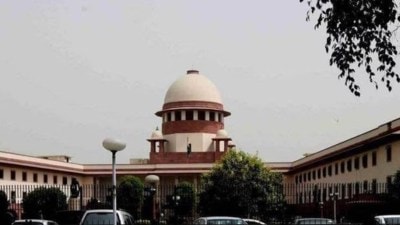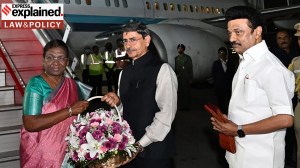Bank merger mania gains momentum — UTI Bank, GTB to merge
MUMBAI, JAN 24: In yet another instance of consolidation among new generation private sector banks, UTI Bank and Global Trust Bank (GTB) h...

MUMBAI, JAN 24: In yet another instance of consolidation among new generation private sector banks, UTI Bank and Global Trust Bank (GTB) have decided to merge. This mega merger — the first mega merger/takeover in 2001 — comes a week after the shareholders of ICICI Bank cleared the merger of the bank with Bank of Madura and almost a year after HDFC Bank merged with Times Bank.
In a communication to the stock exchanges, both banks said that a meeting of the board of directors of UTI Bank Ltd is scheduled to be held on January 27, 2001 to consider the amalgamation of UTI Bank Ltd and Global Trust Bank Ltd. “The board will also deliberate and consider the recommended swap ratio as per the valuation report of SBI Capital Markets Ltd, a leading investment bank,” the notice said.
Once through, the combined entity to be called UTI Global Bank will be the largest new generation private-sector bank in the country with a networth of Rs 929 crore, 157 branches, 312 ATMs, Rs 7,904 crore in advances and Rs 15,664 in deposits based on the March 2000 balance-sheet of these two banks. Said UTI chairman P S Subramanyam: "It is a merger among equals… the merger between the two banks will create shareholder value. The new entity will effectively combine the strengths and complementary features of the two banks. It will be strongly capitalised with a networth that will be in excess of Rs 1,000 crore be end-March 2001".
While present UTI Bank chairman and managing director P J Nayak will head UTI Global Bank, GTB’s Ramesh Gelli will get a place on its board and will also head the insurance venture of UTI Global Bank. UTI will also pick up a stake in the insurance venture while the third partner will be a foreign player. The current executive director of GTB S Subasri will hold the same rank in UTI Global Bank.
As on March 31, 2000, GTB had a share capital of Rs 121.36 crore with deposits at Rs 6,198.85 crore and advances at Rs 3,211.01 crore. Its book value was Rs 43.52 with EPS at Rs 8.74. In the case of UTI Bank, share capital stood at Rs 131.90 crore, deposits at Rs 5,720 crore and advances at Rs 3,506.62 crore. The bank’s book value and EPS stood at Rs 18.16 and Rs 3.73 respectively.
“The board will consider the scheme of amalgamation to be approved subsequently by the shareholders and RBI and relevant authorities, for the purpose of amalgamation of the two banks,” the notice said. On the BSE, UTI Bank share closed at Rs 49.85 while GTB closed at Rs 93.95 as compared to their previous closing of Rs 48.50 and Rs 83 respectively.
Last week this newspaper had reported that UTI Bank is looking for a strategic partner for achieving growth through takeovers and mergers. The UTI Bank’s blueprint includes further capital infusion and branch expansion.
"The bank’s immediate priority is to increase its capital either through a rights issue or through the debt route,” a top UTI bank official had said earlier.
Analysts say that with the UTI Bank’s merger with Global Trust Bank, there would be tremendous pressure on IDBI Bank to join the race or it would run the risk of being left out. IDBI chairman M S Verma had indicated last week that the bank would shed around 25 per cent stake to some strategic partner. "Similarly, other remaining banks like Centurion Bank and IndusInd Bank may not be averse to the idea of a tie-up or merger," said a banker.
Analysts say that consolidation in the country’s banking sector made a beginning last year with the HDFC-Times Bank merger. A recent survey shows that the number of takeovers in India rose considerably in the recent past. The country saw a four-fold rise in activities pertaining to mergers and acquisitions in the year 1999 — the sharpest rise by value since economic reforms hit the country in 1991-92.
In the closing months of the year 2000, ICICI Bank had announced its plan to acquire south-based Bank of Madura (BoM), to create the largest private bank in the country. The ICICI subsidiary was so desperate to grow that it completed the deal in only about two weeks.
The M&A trend is observed not only among the new and old private sector banks, but even between public sector banks. State Bank of India, country’s largest banking entity, is also planning to effect a mega-merger of its seven associate banks with itself in the next six months.
However, there is a great fear that merging banks will grab greater market shares, and there will be lesser breathing space for the small banks. The notion of a perfectly competitive environment in the banking sector is also threatened, because `bigger’ is percieved as greater concentration of power.
In contrast to that negative view, some analysts opined that while mergers have certainly reduced the number of banks nationwide, concentration of power in local banking circles has not increased. Another important factor is regularisation of cost. According to rating agency, CARE, the main objective behind mergers is reducing the operational cost of the banks and increasing their productivity. After a merger takes place, the cost of overhead capital can be brought down considerably. Accomplishing cost efficiencies are often cited as the prime reason behind mergers
However, analysts say while merging, banks should keep in mind that the inherent strengths of a taken over bank should be on firm ground. Fundamental features like NPA levels and capital adequacy should be under the regulatory levels when merger takes place. The taken over bank, ideally, should have some presence and power in the industry. “When banks are searching partners for merger, they should try to add value to their operations rather than merely adding to size,” analysts said.
Photos




- 01
- 02
- 03
- 04
- 05



























